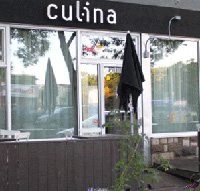Culina Mill Cree, Edmonton
When Culina Mill Creek opened in Edmonton in 2004, “local wasn’t even a word” on the city’s restaurant scene, says founder Brad Lazarenko. Committed from the start to support local businesses and producers, Lazarenko later opened a café in the city’s Muttart Conservatory, (which uses lettuce and herbs grown on site) and a “comfort-food” cafeteria in the city’s police station. He buys lamb directly from the farm and sources beef and other ingredients through Full Course Strategies, an organization which matches producers and restaurants across Alberta. The executive chef says today’s locavore customers are more open to different cuts, from beef cheeks to brisket. “If everyone bought tenderloin, farmers wouldn’t be in business for very long,” notes the chef. Yet, Mill Creek’s signature meat dish remains incredibly popular — a grilled 10-oz Alberta striploin with mashed potatoes and two sauces: bitter chocolate and red wine and a blue cheese cream sauce ($32).
 Ratinaud Charcuterie and French Cuisine, Halifax
Ratinaud Charcuterie and French Cuisine, Halifax
French-born and -trained chef Frederic Tandy got his first taste of Canada while cooking for three summers at the Celtic Lodge in Cape Breton, N.S.; eventually he made Halifax his home. In 2011, local bank executives balked when he proposed opening a real French bistro, so he founded an authentic charcuterie called Ratinaud, his mother’s maiden name. Friends said he was crazy to open in the city’s rough-edged north-end, but locals lined up for his prepared food, homemade pâté and cured meats, including Nova Scotia’s first prosciutto, cured two local legs at a time. Chorizo($16.50/kg) is Tandy’s most popular sausage, seasoned with smoked paprika, chili powder, red-wine vinegar and garlic, but there’s also blood pudding, Toulouse sausage for cassoulet (both $15.50/kg) and pure lamb merguez ($32/kg). And, basil and fresh-ground fennel-seed sausage was a summer favourite ($15.50/kg). Meanwhile, his ‘Kitchen Table’ dinners, inspired by local ingredients, have proven so popular, he rarely enjoys a free Saturday night.
Union Local 613, Ottawa
When chef Christopher Lord and his partners thought about what type of restaurant was missing in Ottawa, southern-style barbecue came to mind. A year later, they opened Union Local 613 — the “brotherhood of growers, cookers and eaters” — in a heritage building downtown. Since then it has attracted a loyal following with its small meaty menu, cocktails and late operating hours. The star of the show is crisp fried chicken served with Tabasco-like pepper vinegar ($14; grits to share are $5 extra). Fried pickle spears with spicy ranch dressing ($4) and fried bumbleberry pie ($8) complete the crispy part of the menu. Pork is also popular, from hickory-smoked jowl with watermelon salad ($18) to a half rack of smoked side ribs ($18) with a mustard-based Carolina-style barbecue sauce and bread-and-butter pickles. Even the sides are meaty, but Lord can adapt the recipes for vegetarians. For example, he can remove the rabbit from the sautéed rainbow chard and chilies ($6) or fry the cornbread ($6) in oil or butter instead of lard.
Next: Three Ingredients and One Technique That Complement Meaty Dishes





















